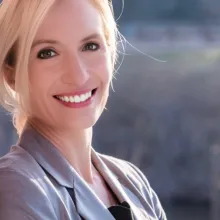
Ep: 29 All-Female Powerhouse
Listen in to our series “Let’s get technical: Meet the Outstanding Women in Manufacturing & Technology” for a continued discussion on a “Strong Women” community. In part 2, members explain how they support and empower one another in order to succeed professionally in this latest panel discussion.
Powerhouse all-female panel discussion to empower women
Our panel discussion on the “Strong Women” community continues with some of the group’s most outspoken and enthusiastic members. Meet Hydee Ong, DELMIA Portfolio Marketing Director in Long Beach, California; Rachel Skousen, ENOVIA Sales Expert, Royal Oak, Michigan; Christine Vandiver, DELMIAWORKS FP&A Analyst, DW Finance, Massachusetts; and Rebecca Huus, High Tech Sales Transaction Support, Minnesota. Tune in as they tackle topics of assertiveness, equity, and the importance of the “Strong Women” community.
Learn how they support and empower one another in part two of our "series on "Strong Women."
“You can always tell who the strong women are. They are the ones you see building one another up instead of tearing each other down,” - Unknown

Meet Our Speakers

Rebecca Huus
Dassault Systèmes Sales Operations, focusing on the High-Tech industry

Hydee Ong
DELMIA Portfolio Marketing Director

Rachel Skousen
ENOVIA Sales Expert

Christine Vandiver
DELMIAWORKS FP&A Analyst, DW Finance
You can follow the DELMIA "Global Operations on the Go" podcast on Apple podcasts, Spotify, YouTube Podcasts, Deezer, by RSS or wherever you get your podcast


![]()


Strong Women’s Group Series Part 2 of 2
Introducing the Strong Women’s Group Panel
00:05
Welcome to our DELMIA podcast, Global Operations on the Go. I'm your host, Therese Snow. Our series that features women who are making a difference in the areas of manufacturing and technology continues. You may recall our last episode with Rebecca Huus on Dassault Systèmes’ Strong Women Group. Today we're going to continue that topic with a panel discussion with some of the women belonging to Strong Women. Ladies, I am so happy to have you on our podcast today. Why don't we start with some introductions?
00:35
Hello, I'm Hydee Ong and I'm the DELMIA Portfolio Marketing Director out of Long Beach, California.
00:41
I'm Rachel Skousen. I'm an ENOVIA Sales Expert based in Royal Oak Michigan.
00:47
And I am Christine Vandiver. I'm a DELMIAWORKS FP&A Analyst out of Boston, Massachusetts.
00:54
And my name is Rebecca Huus. And I'm in a High-Tech sales transaction support role based out of Minnesota. And yes, so just starting to recap from the last episode, the Strong Women community had begun and was established when a group of women, including all of us, from Dassault, attended two webinars that were being offered by Dassault Systèmes. One was on assertiveness training, and the other was on confidence building techniques for women.
The Start of the “Strong Women’s Group”
01:21
I attended that class, it was called assertiveness training for women in business, which was a great title as a way to reset my outlook. Like a lot of people, I was experiencing some COVID burnout and wanted a fresh perspective. Our third university classes are an amazing resource for fresh perspectives. And this one, in particular, has such great energy. When the opportunity to continue engaging with this community was presented, I was onboard.
01:49
And I also attended the same class as the rest of the women to help me transition from having my own company before COVID and returning back to the corporate world in the midst of COVID. It was during the breakout sessions during the training that we found common interest and staying in touch. And Hydee, I agree with you, the 3d university classes, we are pretty lucky to have those. Those are great.
02:10
I was really excited. I attended the assertiveness and communications training in November 2021. I had literally just started with Dassault in July. And I really wanted something to help me gain some confidence in my communications with colleagues and upper management. And what I found was that that class was great and so much more, I really connected with the women in the training. I didn't want to lose that, you know, once it was over. So thankfully, all of you felt the same. And that's how we got started with the Strong Women community on our internal platform. And now we also do quarterly virtual gatherings, which is wonderful.
02:43
Yeah, and just as Christine just said, it was just trying to gain that network. And that was an amazing outcome of the training. And so, part of the reason why I had initially attended it was just basically to learn techniques in expressing myself more effectively, setting boundaries and standing up for myself. And however, you know, I just had a deeper reason for really enrolling from that which was stemmed from an experience just being new to corporate America and also, Dassault since I had just started with Dassault in July of 2021. So, very exciting to continue networking with all of the ladies that joined that training.
03:18
Fabulous. Well, these are definitely some excellent reasons and a true testament to the impact of training here at Dassault Systèmes. So, can you tell me what exactly is the group's mission?
The Mission Possible
03:28
We actually had a meeting recently where we discussed that and defined the mission for our community. Basically, it is to create a supportive environment for women to lift each other up, grow in their careers, promote self-confidence, influence each other by sharing knowledge and advocating for women's equity across the organization. Therefore, we encourage all women to propel professionally.
03:50
Oh, absolutely. So, what are the women getting out of the group meetings?
03:54
You know, for me, it's to gain different perspectives from different people. Oftentimes, we can be so silo vision, that we approach situations from the same angle over and over again, just within our own silos. Hearing other women go through different challenges always gives me the opportunity to learn and as well as offer some insight.
04:14
For me, it's been shared experiences, and then also just the resources. Every woman brings her own experience and expertise in different structures here at DS. So that helps and also, to Hydee’s point, it gives you a better perspective and a broader perspective. But one of the things I love about this group, is that we each have each other's best interest at heart.
04:35
Yeah, I would totally agree with that, Rachel. It's so wonderful just to get on these calls and listen and hear people and then also just be really respectful. I feel like everyone tries very hard not to step on anybody else and to be you know, listening and hearing them and supporting them.
04:53
Yeah, and especially for me, what everyone else has also said, it's just the networking aspect and just building those relationships. So, for me being new to Dassault and you know, to corporate America, there's a lot of new things that I'm learning and going through. And then when I attended these trainings, just hearing and having this support system was critical just to even feeling, you know, more supported as I begin my career and, and this has been a huge valuable group. We are basically setting, you know, giving me a community where I feel safe and, and can learn and learn from all these and almost have like a mentor from each and every one of them. So, it's been a great opportunity to just network and learn from everyone.
05:35
Sure know, that sounds definitely fantastic. I'm so interested in hearing more about this. So, has the group had an impact on the member guests professionally and personally, such as learning through others and feeling supported?
05:48
Oh, definitely. I absolutely feel supported in this group. For me now, we're women lifting women up. It's a very different kind of support system, and we're not reinventing the wheel.
It’s All in the Name
06:11
So how exactly did the community get its name, Strong Women?
06:15
Well, that actually came from I believe, our instructor shared a quote, and we all really resonated with it. In fact, we posted it to our community platform. And that is, you can always tell who the strong women are. They are the ones you see building one another up instead of tearing each other down.
06:30
I love that it's absolutely so true, and definitely words to live by. So, in the spirit of International Women's Day, and you know, March is International Women's month, where the theme is Embrace Equity, what exactly does that mean to you?
What Does Equity Mean to You?
06:44
For me, it means pay equity. You know, there's the National Labor Relations Act, which allows us to discuss our wages. So, for me, having that freedom to discuss wages and understand where I stand in the scheme of things is really important. And then it also means an ability to talk with our company, or our managers about comparisons in gender and just have those honest, transparent conversations. You have a right to ask your boss if you're equitable. So those are all what it means to me.
So, really quick facts about how this impacts women. I was watching, I just quickly caught a news story a couple months back, and they were talking about how women have less in retirement and preparing for today. I did some research and I found a CNBC article from March of last year that spoke to some of the data around this. And it said that the government data shows that women earn an estimated 83 cents for every dollar earned by a man. Now this is averages and I understand averages don't speak to everybody's experience. But for the sake of what the average woman goes through, that adds up to over $10,000 in the gap in median wages every year. By the end of her career, a full-time average working woman will have lost out just under a half a million of income. So how this connects to retirement is assuming a 6% annual rate of return, the group found investing 20% of those earnings could yield an additional, over an additional 300,000 in retirement savings. If all the money was invested, it would boost retirement income by 1.6. And that's even more severe for black women and Hispanic women. For black women, it's almost a million dollars, according to cap, the sum translates into as much as 3.8 million in potential retirement savings. For Hispanic women, it's missing wages of 1.2 million over their careers, which would end up costing them 4.5 million. Isn't that crazy?
08:50
It's amazing how that compounds.
08:52
Yeah, no, it really is, especially when you mentioned you know, over the course of you know, your work, career and retirement and how that impacts that information is certainly jarring, something that all women need to know. Pay gaps are definitely obvious when you state it that way. So, speaking of pay gaps, Rachel, I understand you have a story about your grandmother who experienced the very thing. Would you mind telling us about it?
Women’s Rights from Days Gone By
09:14
Yeah, I would be happy to tell you. So we were talking about this a couple of meetings ago and I decided that I'd bring it up here because I really find my grandmother inspirational in a lot of ways. So, my grandmother worked the line at the General Motors Cadillac plant in Hamtramck, Michigan for more than 30 years. I remember going with her to the plant to pick up her check on pay day a couple of times. This was in the 80s and I was under the age of eight, at least. I will never forget what it felt like walking into that huge loud building. My grandmother set example for me that she could be there for us and work at the same time in her own way. I always felt like she was an active part of my life.
So, recently I got curious trying to understand why my grandmother, though she lived modestly, was able to enjoy her retirement. If she wanted to go to Hawaii with other seniors, she was able to go to Hawaii. Working the line for so long afforded her a much more comfortable retirement than I think I will even be able to have. She was a single mom of three. And our stories are different, but similar, and I'm a single mom of three, and I have three kids also. When I looked into why she was able to afford a comfortable retirement, I learned that my grandmother benefited from a group of women that campaigned to make the same as men on the assembly line back in the 1930s. So, really quickly, I'm going to try to tell a quick story, can't promise, but it'll give some context.
In the 1930s, Florence St. John, along with her co-workers at the General Motors Old Mill plant, not the same plant, my grandmother was at a different plant, won a hard fought victory for fairness, winning a pivotal case that would help my grandmother earn equal to the men she worked with years later. St. John discovered a pay disparity during a game of check pool. Recently learned what this is, and that is you call off different numbers from your paycheck. Remember the old days when people used to have to go collect paper checks before direct deposit to entertain themselves on the factory floor. From time to time, St. John and other women noticed a pattern. Men on the same shift with similar jobs and less seniority, some of them the women had trained, appeared to be making more.
Eventually, this resulted in the first major damages awarded in a job discrimination case in the US. A critical but largely forgotten struggle that inspired women and legislatures across the country to take up the cause of equal pay. At that time, 76 cents an hour to, 76 an hour is what the women were making compared to the men's 97. Lower pay didn't mean lighter loads for the women who among other duties had to drag around huge pans full of car parts weighing up to 200 pounds, often without assistance. If they didn't meet the strictly enforced quotas, the men and the women knew they would lose their jobs equally.
It took until 1945 when the women in the class action lawsuit were awarded the lost wages. But I learned, and I learned this all from a Smithsonian article that I think it was published last year. Not only did these amazing women take a stand, but they used a law that is still on the books. I was talking to a friend of mine as a lawyer and we went to lunch and I asked him like, is this still on the books? And he said, yeah. It's Michigan Penal Code, Section Number 328, Section 556. And it's a misdemeanor in the state of Michigan still to this day to discriminate in any way in the payment of wages between sexes.
What is inspiring about St. John's fight for equal pay for equal work is how one isolated incident had a significant impact, and even my grandmother's life, thanks to St. John and her actions, along with her lawyers and the women who stood with her. My grandmother and other women working at General Motors’ plants across Michigan are paid equal wages to men, allowing them a level of independence and freedom that was not common for women of their time. While this progress did not extend to women and white-collar careers, it was a start, and we still have more work to do, more than 50 years later. Despite this, the benefits of equal pay for equal work are significant, including promoting gender and racial equality by reducing pay gaps and creating a more diverse and inclusive workforce. It also boosts employee morale and productivity, reduces turnover rates and enhances a company's reputation, making it more attractive to top talent. Additionally, fair pay for women and minorities increases the purchasing power, leading to increased economic growth that benefits businesses, communities, and the overall economy.
13:35
So, thank you. That's definitely an incredible story, really sounds like there were a lot of inspiration coming from women before us and sounds like your grandma was quite an inspiration herself.
13:58
That's a pretty incredible story, Rachel, you must just be in awe of knowing what your grandmother did for not just for you, but for a lot of us in the area of pay equity. But you know, what's also really significant, along with a lifetime earning losses for women that you refer to, is the global economic impact of not lowering the gender gap. Just this week, Moody's Analytics published a study focusing on closing the gender gap to unlock productivity gains. When you look at the participation in the labor force, closing the gender gap and management positions can actually raise global economic activity by approximately 7% or $7 trillion. And closing gaps in large emerging economies, including India, would raise it even more. Now that stems from a rise in the number of women joining the workforce and a greater share of women in more productive managerial and professional roles.
What’s Standing in the Way?
14:58
Makes you kind of wonder what's standing in the way. My understanding is that that one of the drivers is a lower workforce participation, sometimes called the motherhood penalty and I experienced this myself. Basically, when my children were younger, four years old, and one year old, I got laid off. And we had to make a decision, because we were also faced with an early diagnosis, high functioning autism in my four-year-old, and we made the decision that I would stay home—provide him and our younger child the care that they needed in order to give him the start that he needed in order to be mainstream when he got to grade school.
Fast forward, it was successful. I spent five years home. I don't regret that. But I definitely feel like it put me behind. I had to basically restart my career and I would say only recently, did I start making more than I was making when I stopped working. So, I feel like that motherhood penalty is definitely real. I will admit that, you know, fathers have stood up and taken on that role, but it's still predominantly women who end up bearing the burden of staying home with kids. I recently found a Pew Research Centre article, the stay-at-home share of US parents was almost identical to what it was in 1989. There was a modest increase among fathers, the share of dads-at-home rose by 4% - 7%. But the share of stay-at-home mums remained largely unchanged. Basically, between 2016 and a quarter century earlier, it was still 28%.
16:33
Wow, that is a really interesting fact that the stay-at-home share of parents is almost identical to what it was in 1989. I do think that it is smart to have someone stay at home, especially with how high the cost of childcare is, but also because it is a special time in life to have a family. Thus, I really do think that the decision to spend those five years at home was a great decision on your part, Christine. As like you said, it helped develop your children into grade school. This is important, and it is upsetting to hear of the experience that you had. Having to reset your entire career after those five years and now only recently making more money than you did prior to having children. For the generation that doesn't have kids yet, like me, when I hear something like this, it puts so much more pressure on even just meeting someone, choosing to be married and have children. Because of the pressure it has and knowing how this could impact a career, an increasing number of people are choosing to delay having children or stay single.
With that said, I think that this motherhood penalty also plays into another issue for women related to gender equity, which is the forced marriage issue. So, what comes to play with the forced marriage aspect, there's a couple of facts when I was looking into it. But you know from a 2023 study surveying US adults, both single and not single, there are many key findings that support the financial perk that comes with being even married. Firstly, the data from the survey showed that one in three admit that they have stayed in a relationship longer because of its financial benefits. In addition, 76% of married people reported they feel more financially secure since getting married. A quote from certified financial planner, Marcy Keckler shared that many people choose to stay together longer, in part to avoid the pain of having tough money conversation and potentially, higher expenses. This means that the way the economy is structured makes it difficult for a single person to live, which has a significant impact on an individual's decision which would support you know, the route of marriage.
This has a significant tie to gender equity. A woman is getting paid much lower than a male counterpart. The financial part is a huge aspect in terms of the decision, which becomes even larger, you know, when kids and pets are involved. But this may cause a woman you know, in an unhealthy relationship to stay in that relationship simply even if to feel safe and just have a place to live. And like Christine was saying and how she shared the fact that taking time off from work to care for children, puts a woman further back in her career than a male, which as evidenced by the facts, affects not only her professional experience in landing a good job, but also the pay increase sacrifice by taking that time off just to care for her children. Granted, I know it's not always the case as sometimes you know, the roles switch but right now, you know, as Christine mentioned, it's predominantly female. And so that has a huge impact on a woman's career.
And then I also wanted to add a point in regards to taxes. 93% of singles acknowledge the burden of the singles tax on top of that, 59% of those surveyed reported inflation even made the singles tax even worse, which personally I've experienced all of that self. With being an single individual, you are taxed way higher and I noticed this as I was doing my taxes this year. You know, if I was married, I'd be saving close to 3,500 in taxes, which is quite a substantial money that could help me out and others I'm sure. But granted, I do see the value that the tax benefits has for being married, and especially when children are involved. But all in all, what this means is that, you know, forced marriage then becomes a higher issue, I guess. And that, you know, contributes into the gender equity, and it all kind of relates with going back into women caring for children, and also in a sense that mainly with, you know, Christine's point on how that impacts her long-term professional experience.
20:44
So, Rebecca, that's really interesting information about the taxes. I mean, I frankly, really had no idea, do you have any personal situations or stories that can kind of speak to this?
Addressing Challenges
20:57
Yeah, so I guess, with being a single individual, in today's economy, it definitely has been, you know, very interesting, you know, being new to corporate America and starting my career. There's definitely been challenges and you know, that transition from college to the workforce, and experiencing that, I guess, with my start at Dassault, I had moved actually across states to land this opportunity with the internship at the time I was enrolled, you know, as a halftime MBA student. And then my initial plans were really to maintain that internship for the duration of the year, and then in which I finished my MBA. And then with that being said, with making the move to Charlotte, I had decided, you know, at the time, I was going to live with my boyfriend. And that was a personal decision, of course, but when, you know, a couple months into it, I realized, you know, things weren't going that great. But at the time, looking at a place, even just to live as a single individual, it was very challenging, you know, being in a new city, without the support of family and friends, it was, it was a huge decision for me to, you know, look at, you know, trying to live by myself. And then looking at it in the perspective of being a single individual, it's almost like a luxury in itself to live alone in today's economy. And what this means in regards to women, and the gender equity is, you know, the independence aspect towards it. And, you know, in order to have that independence, the gender equity is a huge factor, in the sense that a woman would have the opportunity to, you know, live by herself and all that stuff.
To cut a long story short, right now I'm living with family, from that transition from, you know, college to, you know, moving to Charlotte and all that. But now, with the realization in today's economy, where, you know, there's plated pricings, in order to really, you know, save money and meet my financial goals, I decided to live with family, and I think a lot of people push back on that. They're like, you should live, you know, on your own. But I think a lot of people probably, you know, in their mid 20s, within this generation are probably experiencing a lot of the same things, looking at apartments and rent and all that. And so, it's definitely a relevant topic. And something that is strong for me, personally, and why, you know, a supportive women group is so crucial, especially for my career path in the sense of wanting to be an independent woman and work for myself and, you know, provide the means to do so. And so being able to support women as much as I can and network with them, and continue working on getting that gender equity to, you know, hopefully, you know, we've come a long way with history with hearing what Rachel had talked about, or their grandmother. And since then, I guess the topic of gender equity has become more normal, I would say, but more so it's more of like a common issue known. But you know, there's still the difference. And there's still things that could be fixed. And so, it's just really interesting to see, and be a part of a group that is so supportive of women. And so, this is why this Strong Women group is so important and great for me, especially being early on in my career.
24:20
No, absolutely. I you know, I think there's so many topics that have been discussed within your group. And even today, I'm really pleased to see how vital really your group is. So, I'm wondering if a woman listening out there wants to start their own group or join a group, how do you think she should get started? What's the best way?
24:39
Well, we would encourage her as we did, to network with women around you and connect on shared experiences. You know, improving gender parity in management is just one area you can tackle. Factors such as the lack of access to the same connections as men, women being less likely to ask for promotions, and women being held to a higher standard as men. Those are all obstacles that need support and encouragement and shifting these social norms will take time. And to quote Brené Brown, New York Times bestselling author, research professor, and esteemed TED Talk speaker, we can't ask people to give us something that we believe we are not worthy of receiving.
25:23
Absolutely. So true and definitely good advice. This panel discussion has been truly inspirational. I wish we had more time to chat. Thank you, ladies for joining today.
Final Thought
25:35
Thanks so much for having us. I just want to share a final thought. I just want to stress that we need to be, and I love this term, I heard it just yesterday, solutionaries of our own success, just to follow up on what Hydee said. And I'm borrowing that term from Amanda Ellis who spoke recently on women's equity to an audience of Dassault Systèmes’ employees. She is an economist and a former EU ambassador from New Zealand and a founding member of the Global Alliance for women. And she was so inspiring. She talked a lot about the kind of networking and support that helps women be successful. And it reminded me so much of our group and why we feel like it helps us.
26:11
Oh, that's great. Thanks for sharing that. And it's good to know that there are more groups out there and especially you know, within Dassault Systèmes’ where people want to train and grow and learn from one another. So, ladies, thank you again and right and I wanted to thank our listeners for tuning in. I'm your host Therese Snow and you've been listening to Global Operations on the Go.
SUMMARY KEYWORDS
women, pay, work, group, career, life, retirement, share, learn, gender equity, hearing, years, men, systems, training, attended, assertiveness training